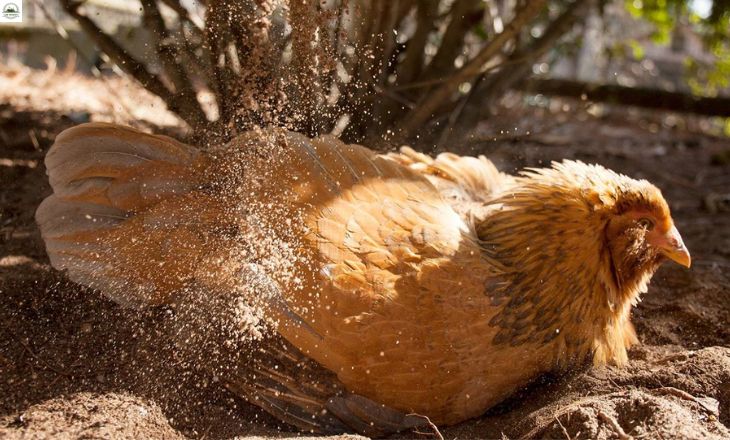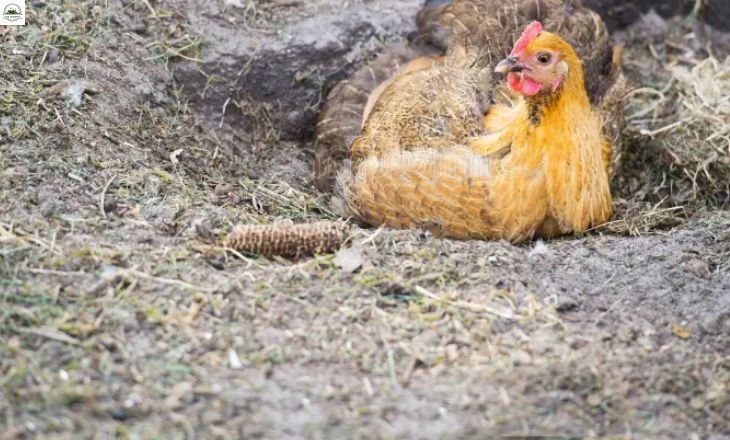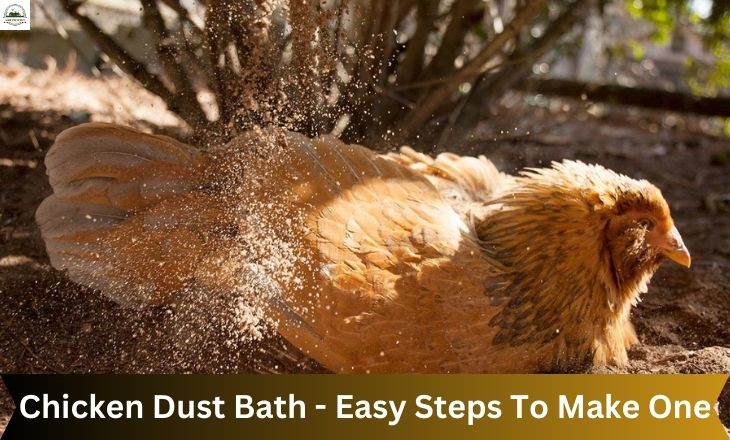Creating a chicken dust bath is important for their cleanliness and enjoyment. To make one, choose a large container and fill it with sand, wood ash, and diatomaceous earth. Place the container in a shaded area in your coop or run.
Chickens will naturally know how to use the dust bath by kicking and fluffing their feathers in the mixture. This helps keep them clean and free from pests. A dust bath also allows chickens to show their natural behaviours, which is good for their health.
Understanding the Need For Dust Baths
The chickens have interesting grooming habits. The Best dust bath for chickens is dust bathing, which is essential for their health. It helps them stay clean, regulate body temperature, and keep away parasites. Giving chickens a good dust bathing spot is necessary for their well-being.
What Is Chicken Dust Bath
Chickens naturally take dust baths to clean themselves and control pests. Rolling in the dust covers their feathers with particles that kill parasites like mites and lice, keeping the flock healthy. Even though it may seem strange, dust bathing is crucial for chickens’ well-being.
Hygiene and Parasite Control
Chickens roll in the dirt to keep clean and avoid pests. Dust baths help soak oil from their skin and prevent bugs like mites and lice. It’s also a way for chickens to bond and show their social order. Watching them do this group activity is fascinating. Dust bathing is essential for chickens’ hygiene and social life.
Diatomaceous Earth For Chicken Dust Bath
Diatomaceous earth is a natural product that can help your chickens stay healthy and happy. Its tiny particles have sharp edges that fight parasites like mites and lice. It also absorbs extra moisture from the chicken’s feathers, keeping them clean and dry.
Adding diatomaceous earth to your chicken’s dust bath promotes good hygiene and gives them a spa-like experience.
The powder is a gentle exfoliant, removing dead skin cells and improving skin health. It’s a safe and affordable option for poultry lovers who want to enhance their chicken care routine.

Crafting the Best Dust Bath for Chickens
Crafting the best dust bath for chickens involves more than just throwing some dirt in a corner of the coop. To create an optimal dust bath, consider adding diatomaceous earth, which can help control parasites and keep your chickens healthy.
Mixing in dried herbs like lavender or mint adds fragrance and offers natural pest-repellent properties to the bath.
Step 1: Suitable Container
When choosing containers for your food, consider using mason jars. These glass jars are strong practical and give a rustic look to your dishes. Mason jars store salads, oats, sauces, and pickles. For a special touch, try using small clay pots as serving dishes.
These pots add elegance to your table and help with portion control. Whether serving desserts or appetizers, clay pots are a stylish way to present your food neatly.
Step 2: Starting with Soil
Creating the perfect dust bath for chickens is essential for their health and well-being. Start by choosing the suitable soil – a mix of sand, dirt, and ash works best to help rid your chickens of mites and parasites.
Step 3: Adding Additives
Adding additives to your chicken’s dust bath can help control pests and parasites, keeping your flock healthy. Herbs like lavender and chamomile can also reduce stress in chickens while providing a pleasant scent.
Sand for chicken dust bath: Adding sand to the dust bath can help clean the chickens’ skin and eliminate parasites. Use construction sand with medium-sized grit for the best results.
Peat Moss Soil: Peat moss is a valuable addition to chicken dust baths. It helps keep the dust soft and prevents it from getting too wet. This creates a suitable environment for chickens to stay clean and healthy.
Sulfur Dust: Sulfur dust is a great way to protect chickens from mites and lice. Chickens can use it in their dust baths to eliminate parasites and feel better. Trying different ways to control pests and keep our chickens healthy is essential.
Diatomaceous Earth: Many suggest using Diatomaceous Earth (DE) for dust baths because it can kill parasites. But, some people are concerned about health risks, so think carefully before using it.
Fireplace Ash and Charcoal: Chickens can use fireplace ash and charcoal for dust baths. Ash helps remove parasites like mites and lice, while charcoal detoxifies their bodies and aids digestion. This natural dust bath keeps chickens healthy and clean.
Mountain Rose Herbs: Adding herbs can make your home smell nice and keep pests away. Some good herbs are bay leaves, catnip, cayenne, cinnamon, clove, garlic, ginger, lavender, mint, sage, thyme, and wormwood.
Step 4: Mixing it All Together
- Focus on mixing the ingredients well.
- Gather dirt, sand, wood ash, and dried herbs.
- Think about how each one feels and smells.
- When you combine them in a container, blend their properties to create a nice dust bath for your chickens.
Positioning the Dust Bath
Position the dust bath for your chickens in a convenient spot. Make sure it’s easy for them to reach so they use it often, which helps keep them healthy. Put the dust bath where your chickens hang out, their roost or favourite scratching spot. Keep it dry and sheltered from rain and too much sun to ensure it stays effective.

Conclusion
Creating a chicken dust bath is a simple and effective way to improve the health and well-being of your flock. By following the easy steps outlined in this article, you can provide your chickens with a natural way to keep themselves clean and free from pests. Remember to maintain and refresh the dust bath regularly to ensure its effectiveness.
Your chickens will thank you for it by displaying happier behaviour and healthier feathers. Take the time to make a chicken dust bath today and watch your flock thrive!
Learn more: Can Chickens Eat Bananas? What about Banana Peels?
Frequently Asked Question
Is Potting Soil OK For Chicken Dust Bath?
Potting soil can be used for a chicken dust bath if it is free of chemicals and pesticides.
What Is Sulfur Dust For Chickens?
Sulfur dust for chickens is a natural mineral supplement used to control external parasites like mites and lice in poultry.
Is Sulphur Toxic To Chickens?
Yes, large amounts of sulphur can be toxic to chickens.
Is Zinc Poisonous To Chickens?
Yes, excessive levels of zinc can be toxic to chickens.

